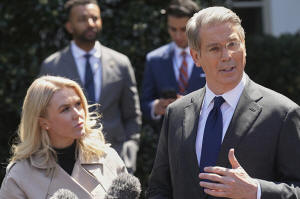Trump limits tariffs on most nations for 90 days, raises taxes on
Chinese imports
[April 10, 2025]
By JOSH BOAK
WASHINGTON (AP) — Facing a global market meltdown, President Donald
Trump on Wednesday abruptly backed off his tariffs on most nations for
90 days even as he further jacked up the tax rate on Chinese imports to
125%.
It was seemingly an attempt to narrow what had been an unprecedented
trade war between the U.S. and most of the world to a showdown between
the U.S. and China. The S&P 500 stock index jumped 9.5% after the
announcement, but the drama over Trump's tariffs is far from over as the
administration prepares to engage in country-by-country negotiations. In
the meantime, countries subject to the pause will now be tariffed at
10%.
The president hit pause in the face of intense pressure created by
volatile financial markets that had been pushing Trump to reconsider his
tariffs, even as some administration officials insisted the his reversal
had always been the plan.
As stocks and bonds sold off, voters were watching their retirement
savings dwindle and businesses warned of worse than expected sales and
rising prices, all a possible gut punch to a country that sent Trump
back to the White House last year on the promise of combatting
inflation.
The global economy appeared to be in open rebellion against Trump’s
tariffs as they took effect early Wednesday, a signal that the U.S.
president was not immune from market pressures. By early afternoon,
Trump posted on Truth Social that because more than 75 countries had
reached out to the U.S. government for trade talks and had not
retaliated in meaningful ways, “I have authorized a 90 day PAUSE, and a
substantially lowered Reciprocal Tariff during this period, of 10%, also
effective immediately.”

Trump later told reporters that he pulled back on many global tariffs —
but not on China — because people were “yippy” and “afraid" due to the
stock market declines. He added that while he expected to reach deals,
“nothing’s over yet.”
The president said he had been monitoring the bond market and that
people were “getting a little queasy" as bond prices had fallen and
interest rates had increased in a vote of no confidence by investors in
Trump's previous tariff plans.
“The bond market is very tricky,” Trump said. “I was watching it. But if
you look at it now, it’s beautiful.”
The president later said he'd been thinking about his tariff pause over
the past few days, but he said it “came together early this morning,
fairly early this morning.”
Asked why White House aides had been insisting for weeks that the
tariffs were not part of a negotiation, Trump said: “A lot of times,
it’s not a negotiation until it is.”
The 10% tariff was the baseline rate for most nations that went into
effect on Saturday. It's meaningfully lower than the 20% tariff that
Trump had set for goods from the European Union, 24% on imports from
Japan and 25% on products from South Korea. Still, 10% represents an
increase in the tariffs previously charged by the U.S. government.
Canada and Mexico would continue to be tariffed by as much as 25% due to
a separate directive by Trump to ostensibly stop fentanyl smuggling.
Treasury Secretary Scott Bessent said that the negotiations with
individual countries would be “bespoke,” meaning that the next 90 days
would involve talks on a flurry of potential deals. Bessent, a former
hedge fund manager, told reporters that the pause was because of other
countries seeking talks rather than brutal selloffs in the financial
markets, a statement later contradicted by the president.
“The only certainty we can provide is that the U.S. is going to
negotiate in good faith, and we assume that our allies will too,”
Bessent said.

The treasury secretary said he and Trump “had a long talk on Sunday, and
this was his strategy all along” and that the president had “goaded
China into a bad position.”
Commerce Secretary Howard Lutnick later seemed to contradict the
president's account by saying it was “definitively” not the markets that
caused Trump to pause the tariffs, saying that requests by other nations
to negotiate prompted the decision.
Prior to the reversal, business executives were warning of a potential
recession caused by his policies, some of the top U.S. trading partners
were retaliating with their own import taxes and the stock market was
quivering after days of decline.
White House press secretary Karoline Leavitt said the walk back was part
of Trump’s negotiating strategy.
She said the news media "clearly failed to see what President Trump is
doing here. You tried to say that the rest of the world would be moved
closer to China, when in fact, we’ve seen the opposite effect. The
entire world is calling the United States of America, not China, because
they need our markets.”
The head of the World Trade Organization, Ngozi Okonjo-Iweala, said the
trade war between the U.S. and China could “could severely damage the
global economic outlook" and warned of “potential fragmentation of
global trade along geopolitical lines.”
[to top of second column]
|

Treasury Secretary Scott Bessent speaks to reporters outside the
West Wing of the White House, Wednesday, April 9, 2025, in
Washington, with White House press secretary Karoline Leavitt. (AP
Photo/Jacquelyn Martin)

Market turmoil had been building for weeks ahead of Trump's move, with
the president at times suggesting the import taxes would stay in place
while also saying that they could be subject to negotiations.
Particularly worrisome was that U.S. government debt had lost some of
its luster with investors, who usually treat Treasury notes as a safe
haven when there's economic turbulence. Government bond prices had been
falling, pushing up the interest rate on the 10-year U.S. Treasury note
to 4.45%. That rate eased after Trump's reversal.
Gennadiy Goldberg, head of U.S. rates strategy at TD Securities, said
before the announcement that markets wanted to see a truce in the trade
disputes.
“Markets more broadly, not just the Treasury market, are looking for
signs that a trade de-escalation is coming," he said. "Absent any
de-escalation, it’s going to be difficult for markets to stabilize.”
John Canavan, lead analyst at the consultancy Oxford Economics, noted
that while Trump said he changed course due to possible negotiations, he
had previously indicated that the tariffs would stay in place.
“There have been very mixed messages on whether there would be
negotiations," Canavan said. "Given what's been going on with the
markets, he realized the safest thing to do is negotiate and put things
on pause.”
The whipsaw-like nature of Wednesday could be seen in the social media
posts of Bill Ackman, a hedge fund billionaire and Trump supporter.
“Our stock market is down,” Ackman posted on X. “Bond yields are up and
the dollar is declining. These are not the markers of successful
policy.”
Ackman repeated his call for a 90-day pause in the post. When Trump
embraced that idea several hours later, an ebullient Ackman posted that
Trump had “brilliantly executed” his plan and it was “Textbook, Art of
the Deal,” a reference to Trump's bestselling 1987 book.

Presidents often receive undue credit or blame for the state of the U.S.
economy as their time in the White House is subject to financial and
geopolitical forces beyond their direct control.
But by unilaterally imposing tariffs, Trump has exerted extraordinary
influence over the flow of commerce, creating political risks and
pulling the market in different directions based on his remarks and
social media posts. There still appear to be 25% tariffs on autos, steel
and aluminum, with more imports, including pharmaceutical drugs, set to
be tariffed in the weeks ahead.
The tariffs frenzy of recent weeks has taken its toll on businesses and
individuals alike.
On CNBC, Delta Air Lines CEO Ed Bastian said the administration was
being less strategic than it was during Trump's first term. His company
had in January projected it would have its best financial year in
history, only to scrap its expectations for 2025 due to the economic
uncertainty.
“Trying to do it all at the same time has created chaos in terms of
being able to make plans,” he said, noting that demand for air travel
has weakened.
Before Trump's reversal, economic forecasters said his second term has
had a series of negative and cascading impacts that could put the
country into a downturn.
“Simultaneous shocks to consumer sentiment, corporate confidence, trade,
financial markets as well as to prices, new orders and the labor market
will tip the economy into recession in the current quarter,” said Joe
Brusuelas, chief economist at the consultancy RSM.
Bessent has previously said it could take months to strike deals with
countries on tariff rates. But in a Wednesday morning appearance on
“Mornings with Maria,” Bessent said the economy would “be back to firing
on all cylinders” at a point in the “not too distant future.”
He said there has been an "overwhelming" response by “the countries who
want to come and sit at the table rather than escalate.” Bessent
mentioned Japan, South Korea, and India. "I will note that they are all
around China. We have Vietnam coming today,” he said.
__
Associated Press writer Michelle L. Price contributed to this report.
All contents © copyright 2025 Associated Press. All rights reserved
 |